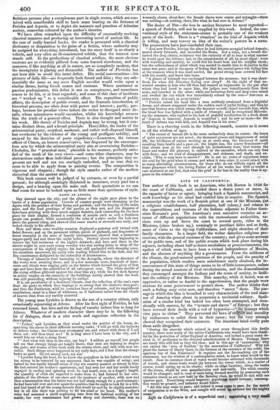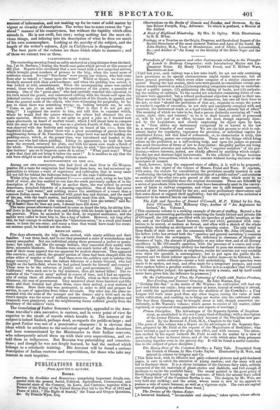LIFE IN CALIFORNIA.
THE author of this book is an American, who left Boston in 1828 for the coast of California, and resided there a dozen years or more, in the capacity of factor or vent; bringing back i Spanish manuscript, and such knowledge as his mind had enabled him to acquire. The Spanish manuscript was the work of a Romish priest at one of the Missions, (or a religious establishment, half plantation, half colony,) and relates to the superstitions and customs of the Indians adjacent to Father Gero- nimo Boscana's post. The American's own narrative contains an ac- count of different negotiations with the customhouse authorities, va- rious runs up and down the coast to several ports, rides to the Missions, (since broken up,) seemingly to purchase hides and so forth, notes of visits to the tip-top Californians, and slight sketches of their family characters. In a larger field, the writer describes religious pro- cessions, with the general customs of the country; and gives some account of its public men, and of the public events which took place during his sojourn, including about half-a-dozen resolutions or pronunciamentos, the upshot of which seem to have been a virtual independence of Mexico, and the absence of anything like a government. From the mildness of the climate, the good-natured quietness of the people and the paucity of the population, which renders mere subsistence easily obtained, the in- convenience of this state of things seems to be of little consequence, unless during the actual contests of rival revolutionists, and the demoralization they encouraged amongst the Indians and the scum of society, to facili- tate the robbery of the Missions. This anarchy, while it lasted, was so oppressive, or rather so fearful to the apprehension, that the people were anxious for some government to protect them. The author thinks that such a feeling may exist now, and therefore " annex " them. The pas- sage in which this idea is broached is very characteristic of the cool man- ner of America when about to perpetrate a territorial robbery. Spoli- ation of a similar kind has indeed too often been attempted, and occa- sionally with success, by time "tyrants and slaves" of Europe; but they have covered their deeds with a veil of hypocrisy—" the homage which vice pays to virtue." They perverted the laws of rearinnd morality
by endeavours to enlist them in their cause ; but ' 'very attempt showed they recognized their existence. The American blind coolly puts them aside altogether.
"During the anarchy which existed in past years throughout this fertile country, there were many of the native Californians who would have been thank- ful for the protection of either England or America; and indeed a great many de- sired it, in preference to the detested administration of Mexico. Perhaps there are many who still feel as they did then: and in this age of annexation; why not extend the 'area of freedom' by the annexation of California? Why not plant the banner of liberty there, in the fortress at the entrance of the noble, the spacious bay of San Francisco? It requires not the far-reaching eye of the statesman' nor the wisdom of a contemplative mind, to know what would be the result. Soon its immense sheet of water would become enlivened with thousands of vessels, and steam-boats would ply between the towns which, as a matter of course, would spring up on its shores; while on other locations, along the banks of the rivers, would be seen manufactories and siuv-mills. The whole country would be changed; and is_tead of one's being deemed wealthy by possessing such extensive tracts as are now held by the farming class, he would be rich with one vaster part. Everything would improve; populatio would increase; consump- tion would be greater, and industry would follow. "All this may come to pass; and indeed it must sem to pass, for the march of emigration is to the West, and naught will arrest ke, kdrance but the mighty ocean." Life in Calffornia is of a superficial cast ; tAntaining a very small amount of information, and not making up for its want of solid matter by vigour or vivacity of description. The writer has to some extent the "go- ahead" manner of his countrymen, but without the rapidity which often attends it. He is not swift, but curt; seeing nothing but the most ob- vious things, and infusing into his description of what he does see much of his own commonplace. Looking at the novelty of the subject, and the length of the writer's sojourn, LYe at California is disappointing.
The best parts of the volume are those which relate to manners ; and of these we extract two or three.
CALIFORNIANS AT TABLE.
The sumieeding morning found us safely anchored at a long distance from the land- ing, [at St. Barbara,] fearing the South-east gales which prevail at this season of the year. Reports were circulated that a new vessel with a new cargo had arrived, which brought great numbers of persons to the brig; when the usual scene of confusion ensued. Several "Rancheros" were among our visiters, who had come from afar to behold a "house upon the water." Whilst at dinner, we were par- ticularly amused with their awkwardness; and when the pudding was served, it was looked at with astonishment. When the accompanying sauce was carried round, those who chose added, with the assistance ot the grater, a quantity of nutmeg. One of the "green ones," who had carefully watched this operation, in his turn seized the grater, and commenced rubbing with his thumb-nail upon the indented surface: not succeeding by the application of his thumb, he paused, and from the general smile of the others, who were witnessing his perplexity, he be- gan to think there was something wrong; so, looking towards me, he said,
Como es quo yo no saco nada ? " "How is that I do not get any- thing?" I explained the matter to him, and told him to examine within, where he would find the source whence the others had obtained the aro- matic material. However, this is not quite so good a joke as I learned took place afterwards on board of another vessel; which I will insert here to compare with the story of the nutmeg. It was on a glorious Fourth of July, and the day was observed with due festivity and rejoicing on board of the —, from the Sandwich Islands. At dinner there was a great assemblage of guests from the neighbouring farms of St. Francisco; when a large bowl was used for holding the pudding-sauce, which, at the proper time, was introduced and handed to the nearest one who had taken pudding. Liking its appearance, he took the bowl from the steward, returned his plate, and with his spoon soon made a finish of the whole. This accomplished, smacking his lips, he said, "Quo caldo tan bueno! Que lastima! que no lo trageron antes de la earns." "What good soup ! What a pity that they did not bring it before the meat!" It is needless to say that the rest were obliged to eat their pudding without sauce.
BACKWOODSMEN ON THE SEA.
Among our own countrymen, who had lived all their lives in tg Western prairies till a taste for emigration had brought them here, we had occasional op- pat-unities to witness a want of experience and cultivation that in many cases did not fall far behind the ludicrous behaviour of the rude Californians.
Whilst lying here, the small schooner U— arrived; and, owing to her light draft of water, she was enabled to run into the creek previously spoken of in the description of St. Pedro. Whilst at anchor there, she was visited by several Americans, detached followeis of a hunting expedition. One of them had never before seen "salt water," and nothing nearer the semblance of a vessel than a common Indian canoe. He embarked with great fear and distrust, and the smell of the ses, with the boat's motion, had probably made him sick. Stepping upon deck, he staggered against the main-mast, "Gory! how she totters I" said fie: "if it hadn't been for that are post, I should have fell down." The same person afterwards ventured to come on board the brig, by sitting him- self down in the bottom of the boat, and holding with his hands upon each side of the gunwale. When he ascended to the deck, he required assistance; and the sailors were called to hoist him in, like a bag of tallow. However, not long after this, he had courage to embark upon the "boisterous ocean," in a small pine-board canoe, to hunt the sea-otter; and many a time that would have made the stout- estseaman quail, he heeded not the storm.
MEXICAN ARMY.
The days afterwards, the brig Chato arrived, with ninety soldiers and their families. I saw them land, and to me they presented a state of wretchedness and misery unequalled. Not one individual among them possessed a jacket or panta- loons; • but naked, and like the savage Indians, they concealed their nudity with dirty, miserable blankets. The females were not much better off; for the scanti- ness of their mean apparel was too apparent for modest observers. They appeared like convicts; and, indeed, the greater portion of them had been charged with the crime either of murder or theft. And these were the soldiers sent to subdue this happy country ! These were the valiant followers of a heroic General, who had fought on the battle-field, where he had gained laurels for himself and country These were to be the enforcers of justice and good government! Alas! poor California! when such are to be thy ministers, thou art indeed fallen ! The re- mainder of the "convict army" arrived in course of time, and I had an opportu- nity of seeing them all afterwards at the Pueblo' when on their route towards Monterey, the seat of government. They mustered about three hundred and fifty men; and their General had given them since their arrival, a neat uniform of white linen. Here their stay was protracted, in order to drill and prepare for service, in case of opposition from Seilor Alvarado. Day after day, the place re- sounded with the noise of the trumpet and the drums; and a level spot on the river's margin was the scene of military mancenvre-s. At night, the gardens and vineyards were plundered, and the neighbouring farms suffered greatly from the frequency of the soldiers' visits.
The translation Or Father Boscana's manuscript, appended to the Ame- rican traveller's own narrative, is curious, and in every point of view far superior to the result of travels which heralds it. The interest of the subject is indeed limited, perhaps dead, as regards the public at large ; and the good Father was not of a penetrative character : it is obvious that ideas which he attributes to the universal spread of the Mosaic doctrines had been communicated by the Missionaries to their Indian converts, who subsequently mixed them up with their own superstitions, and re- told them as indigenous. But Boscana was painstaking and conscien- tious; and though he was not deeply learned, he had the method which belongs to a scholastic training. His Account will be found a curious description of Indian customs and superstitions, for those who take any interest in such inquiries.



























 Previous page
Previous page